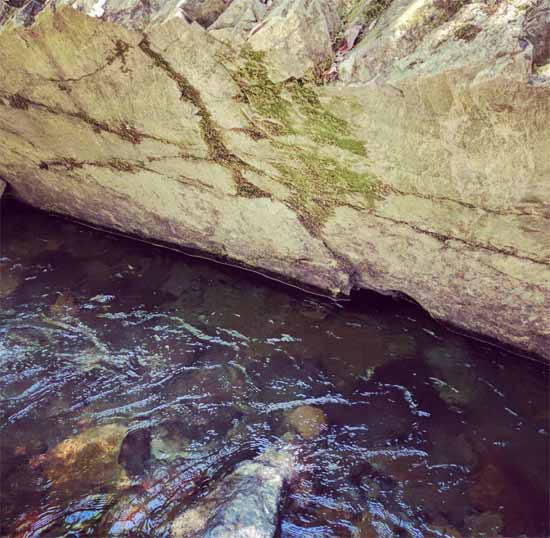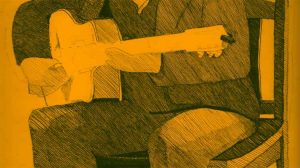The great wall of ancient growth slides its shadow across the river. Alder-cedar-redwood are the color of the afternoon water: serpentine. A breeze sweeps up from the sea. It picks out the leaves of the tanoaks one by one in gold; it turns up the volume on the rapids just downstream. Wild azaleas bloom from the tangled bank, but the wind is wrong for me to catch their scent.

The poet Michael Longley speaks of “the beauty of going to the same place over and over.” I heard these words in an interview, and I scrambled for the pause button.
I have longed for home because I thought that I had none. Later I thought it was because I had too many, each one partial and incomplete. I was born a wanderer by circumstance, and I have loved many places. I read some words of Terry Tempest Williams: “Each of us harbors a homeland, a landscape we naturally comprehend” — and I felt sadness like a well. Homesick for the having of a home.
And then, in the sudden silence from my radio, my particular curve of river sang to me, in the prose words of a poet.
This river and the forest that it feeds are nowhere I have ever lived. Robert Macfarlane, writing in The Old Ways, helped me reconcile this by pointing out that the “landscapes we bear with us in absentia” often influence us most powerfully. I feel the right of this when I consider the words I use to talk about my relationship with this place.
I have visited here regularly, returning each summer alongside my extended family to walk and cook and sleep in this particular out-of-doors. The trees, the river, the rocks grew into me as I grew up. I know the smell of this place the way I recognize the scent of my mother. The rest of the exiled year, I speak as if I’m not quite complete.
When I walk this place, I know the names of the plants, and which can help or harm. I smell the weather changing before I can see it; I call back to birds whose habits I have observed since my earliest years. I’m not claiming any particular woodcraft. I don’t believe I know the depth of what folks who live here may learn. I’m claiming love by attention and affinity, and a conversation based on that, carried through repeated pilgrimage over a human lifetime.
It’s lonely the way my culture likes to do things: living in a place without remembering it’s alive. So I speak to my places, and I try to learn their language. It’s a long process. To learn to read a landscape, you have to learn your letters and then your phonics first. It gets a little easier, maybe, with practice. But one lifetime to one place seems about right for mutual understanding. I have already exceeded the ratio.
And even so, I do have a home land. There this one place in this world I can set my back to.
How does a person inhabit a grace this large, for such a long time before learning to name the gift? I learn everything slowly, at the pace of a forest’s growth.
Crouched by the river, I have yet to touch it. It’s strange this year: thick mats of poison-green algae dance with the current, more than I have ever seen. No one I ask has been equal to an explanation. Is it a temperature shift, a chemical imbalance, a sudden loss of primary predator? It coats the shallows here, beginning four feet out. Isolated tufts cling to rounded stones midstream.
Also the river is the same. Green-gold in the morning sun. Clear, down to the stonebound bed of reds and greens and quartz: the secret colors of trout. Hung with alders at the banks, and reflecting at midstream the old-growth stands it waters.
Red fleece and purple polyester flash through the far bank’s cover. There’s a trail over there, an old acquaintance – but at 10am, it’s too late in the day to follow. So many people, not only here. If I did not rise early, I’d rarely find a solitary walk.

Perhaps – I say this often to myself in the weeks after leaving each summer — if I was able to live at the edge of remote wilderness. I never have, and so I suspect some of that is unexamined fantasy. Wild places are battlegrounds in our culture; why do I imagine I would find peace at that boundary? The places to which a person might run are shrinking. When we do run away, we often step too heavily.
I do not think I imagine the feeling that this is different from my youth. The situation is as much changed then to now as my childhood from my parents’. There are billions more people on the planet, enough of whom flash disposable wealth that wilderness tourism has become a massive industry. The state of California requires permits and fees merely to enter the better-known beauty spots. Even for wilderness areas, protected but undeveloped, there are official entry-points, and forms to fill out at the trailhead. Here be dragons; that will be $15.
Simpson-Reed Grove, where I walked with my husband this morning in quiet, is by this hour overrun with strolling and shouting. My adopted state of Oregon is considering, as I write, a permit system for popular trails in the Columbia River Gorge. Visitors to Multnomah Falls now avail themselves of a carpark and a shuttle, miles down the highway from the waterfall where once a woman of legend hurled herself to her death to save her people. Would that she had, from the tyranny of settler-colonial capitalism.
It does not matter if there is good and bad to this development. I’m tired of the “both sides” obfuscation. The point is, we can’t stop it. All we can do is regulate. Despite my understanding of the need to do so, I agree, with sadness, when inevitably someone in my family sighs as they set up camp: “every year, more rules.”
The mental and physical space to conduct my daily affairs as I see fit feels like a statement of human right. Constraint by reasonable law and consideration for others is a general good. Regulation is where we turn when both of those fail.

Regulations do work: by preventing a thousand small acts of incidental vandalism daily, by slowly inculcating ideas about right behavior toward the rest of the planet. They also burn the hand that struck the match, and run away with the fuel they find. The price of universal access — understand that ‘universal’ still largely means people with two legs, light skin, and enough money — is the smallest of decisions dictated in triplicate. Don’t hang lines from the trees. Don’t poop less than 200 yards from running water. Don’t step off the trail. Don’t gather firewood. Don’t leave so much as a coffee cup on the table while you wander to the restroom. No fireworks, no parking, no noise after 10pm, no more than 8 people camped on a single site. Add your own: it’s a collaborative poem about the price of what we like to call freedom.
We follow the rules: some of us, sometimes. They’re reasonable, considered in the context of our crowded, connected world. But they aren’t aimed at teaching us to be better citizens for each other. Or the forest, or the river, or the bears. They’re emergency brakes, applied to a freewheeling system we cannot imagine our way out of. We try to ameliorate capitalism and other forms of selfishness with laws and punishments, but the problem is one we can only solve by changing our society’s values. Until enough of us behave ourselves out of our profit-worship and greed — until we teach each other to eschew the idea that “I’m an adult, I do what I want” — all the regulation in the world cannot make the world a better place.
Meanwhile, it controls the damage. Talk about a consolation prize. Without it, this home of my heart would be, at the very least, so many board feet of beautiful, rot-resistant lumber. For enough almighty dollars, I could buy it and build myself a new deck.
Every place I love breaks my heart. The love comes in when my heart heals up around it.
Every visit, this place wounds me again. Which is nothing to the ways my species, perhaps especially my culture, has wounded it. The world my generation inherits is every year shown to be more precarious, more polluted, more irrevocably changed by our own hands than we’ve dared to attempt understanding. How do you protect the places you love, when they are already victimized?
We already know how to face this question, in another context. With the best of intentions, we try to protect our family and friends from harm. Eventually, hopefully – often painfully – we learn that the best we can do is to create a supportive space for them. They make their own decisions, and we offer a hand while they recover from their falls.
This, perhaps, is what we can learn to do for our wild places. Could we leave more of them alone, to decide on their own futures? We still have to remove our selfishness from the equation. Our roots are crowding theirs out, making their decisions for them from afar. What will it take to teach us self-control?
In the meantime, I suppose, there is regulation.
One merganser, female, cruising watchfully midstream. One raven, flapping about in the canopy. Rainbow birds in the understory, unseen. Two dippers, yesterday by the otter spot, but none this morning.
I do not have my mobile. That pirate and savior of the modern human is difficult to leave behind. Even the functions that aid my love of place and presence — a camera, a notepad — are tied to a hundred others fighting for advertising space in my brain. Here, and not only here, the weight has grown too much.
I have been sitting idly reading, mostly watching, bare toes inches from the water. There wandered by just now a moment, when I realized I’d been hearing only rapid-rumble and leaf-rustle and stone-slap.
This was the same moment an ambulance screamed by on the highway. In the next, a stranger bruised the trail above me, climbing out on a downed log and exclaiming how ‘sick’ the view. He’s right. Another man came down to my pocket-sized beach with his child, surveying it for a place to play and wonder. He’s onto something, too.
My sympathy and antipathy are close companions. I will wait all of this out. My patience for this place is honed to the cut of midday sun on water. My patience for others of my species is less practiced, but my efforts continue.
Sometimes I think we are the only ally we have left.
The campground I’m sleeping in is quite nearby, developed, to a point. This place is wild, though. Whatever domestications intrude, they eventually leave. Most of them depart promptly — the ambulance wail slices west, and the men breaking through to glory take their shining glimpse back to their cars. Some intrusions erode at a more leisurely pace: witness my own ephemeral presence. When I am gone, the river and the rainbow birds remain, and do not miss me.
I cannot decide if I want them to miss me. As a human in such a world, is my place to step back as far as possible, to create that space where my beloved land may forget me immediately, in peace? Is there a way I can live that would allow it to be grateful that sometimes I am here? To imagine it might count me as a friend?
So this is my work: to learn to love my home places better. How is the question, of course, and I can’t tell you. But I live inside the asking, and you’re welcome here, too.





Tara Shepersky says
Sounds like something I need to read too, Chris! I like the hearth concept.
Thank you very much indeed for the kind words. :)
Tara
Chris La Tray says
This is wonderful. I have been thinking recently myself about my own seeming lack of a true home, or “hearth.” Much of that derives from an anthology coming out next month called HEARTH, from Milkweed Books, edited by a pair of local literati, that I am reading in preparation for writing about. Your piece would fit right in with it.